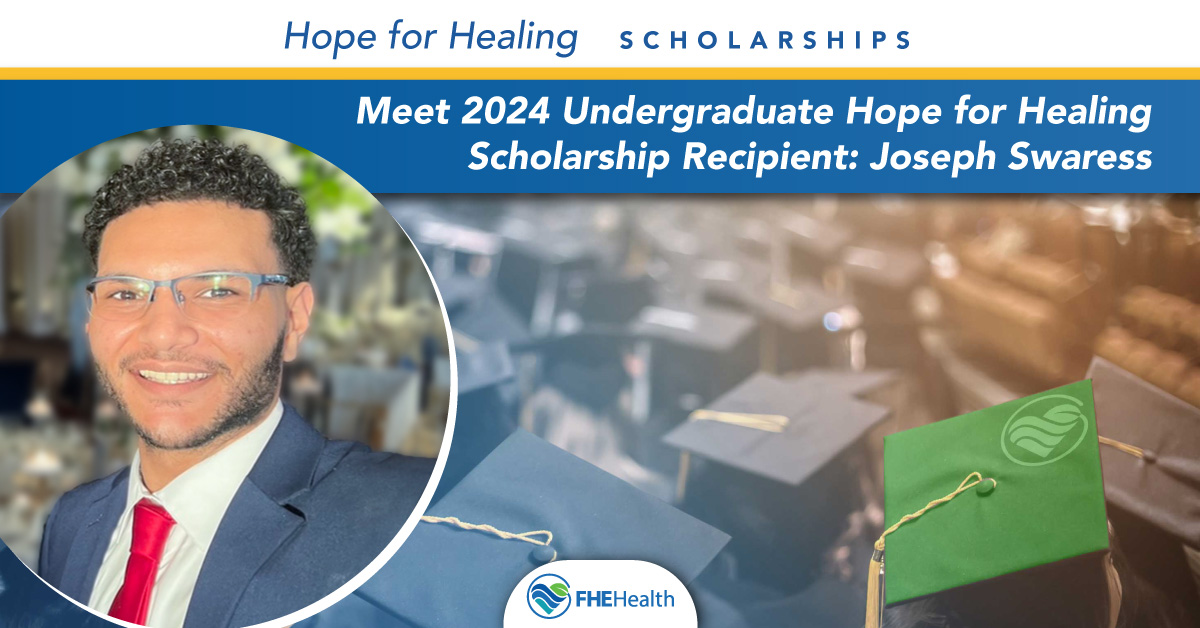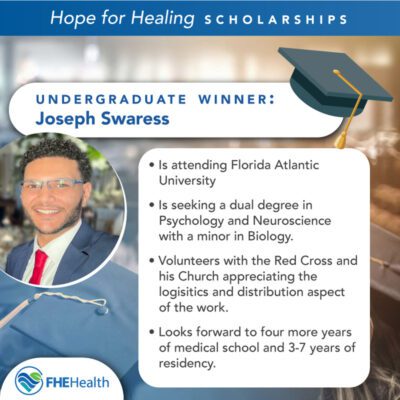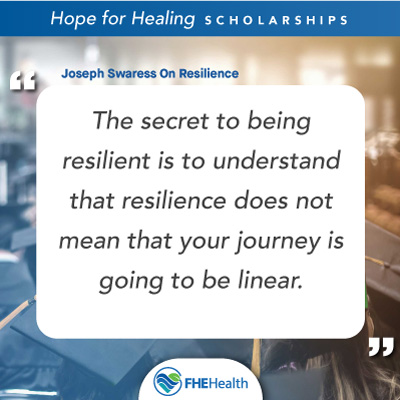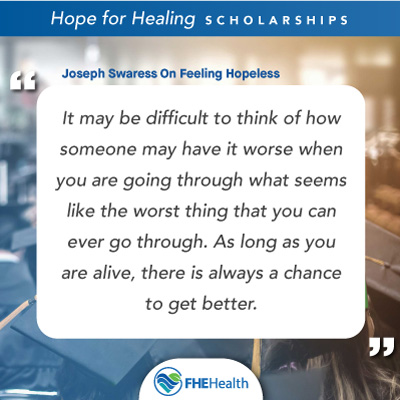
Each year FHE Health awards two outstanding individuals, one an undergraduate and one a graduate student, with a $5000 scholarship to help further their education in the field of addiction, mental/behavioral health and/or psychiatry. In this first of two blogs spotlighting this year’s winners, you’ll meet Joseph Swaress, the undergraduate recipient of the 2024 Hope for Healing Scholarship. Catch his moving story below….
On Valentine’s Day, 2018, five days after he turned 18, Joseph Swaress was sitting in class at Marjory Stoneman Douglas High School when the order to evacuate came across the PA system.
“It was a bit eerie because nobody knew what was going on, and many of us had just assumed that it was another drill,” Swaress recalled in an interview with FHE Health. (At the time he was in his senior year.)
He soon learned why in the process of evacuating. A gunman had opened fire and would kill 17 people and injure 17 others.
Life After the Shooting
 How did that horrific day change Swaress’ life? He said it taught him not to take life for granted.
How did that horrific day change Swaress’ life? He said it taught him not to take life for granted.
In the immediate aftermath of the trauma, Swaress had trouble sleeping, but with time and support he was able to heal. His church, family, and friends “showed a tremendous amount of support, to the point where I was getting calls and texts to check up on me from those I’d never even formally met.”
Lessons from Stage 4 Cancer
A few months later, Swaress was excitedly preparing for his first year of college at Florida Atlantic University when he started noticing bumps on his body. Scans, then tests in the ER, followed, at the end of which Swaress was introduced to an oncologist.
“I didn’t even know what an oncologist was,” Swaress wrote in his essay, recalling that moment. That was also when he would learn he had stage 4 Hodgkins lymphoma.
Peace from God

The days ahead were the hardest of Swaress’ life. What helped him get through? God and the assurance of God’s presence, Swaress said.
“It is unquestionable. When everyone else was asleep, the only peace I had was knowing that there was One who never sleeps who I could talk to.”
The Meaning of Resilience
Cancer also taught Swaress that he could be incredibly resilient in the face of adversity.
What’s the secret to being resilient through cancer and a relapse? we wondered. Here is how Swaress answered that question:
The secret to being resilient is to understand that resilience does not mean that your journey is going to be linear. It does not mean that you will just continue to endure whatever struggle you’re in with full motivation 100% of the time.
In anything that requires resilience, you will fail, multiple times, but that does not mean that you are a failure. Failure happens when two things happen: if you give up or if you remain stagnant. If you fall, you get back up. It’s about showing up on the days that you don’t want to. If you don’t want to show up, just put one foot in front of the other and see where it takes you.
Resilience is about constantly getting better and keeping your eye on the goal.
The Importance of Empathy
Empathy, the ability “to imagine what it’s like to walk in someone else’s shoes,” is needed more than ever in today’s world, Swaress said. He seeks to show empathy in his interactions with others and hopes to do the same one day as a physician at the bedside of his patients— because he remembers what it was like on his worst days.
Academic and Vocational Journey
These hard experiences also helped Swaress discover his vocational path—that he wanted to be a research-oriented physician—and led him to study psychology, neuroscience, and biology.
In psychology, Swaress “really enjoyed learning about the brain” and the role of the conscious and the unconscious mind. “Biology was interesting, but neuroscience and understanding the physiology (neuroscience) behind certain behaviors (psychology) was far more interesting.”
Today, Swaress is earning a dual degree in Psychology and Neuroscience, with a minor in Biology, at FAU.
Service and Volunteering

Swaress draws great fulfillment from volunteering with the Red Cross and his church. With the Red Cross, he does “various tasks which require an extra pair of hands, ranging from installing smoke detectors in impoverished neighborhoods to assisting with registration for the Governor’s Annual Hurricane Conference.”
Through his church, Swaress helps to organize monthly food drives for people experiencing homelessness. They “cook food and assemble hygiene kits and distribute them.”
“It is easier to give money or to volunteer at a soup kitchen, but it is more meaningful in my eyes to do all the planning and work, from purchasing the items to distributing them directly to the people you are helping,” Swaress said.
Post-Graduation Plans
After graduating from college, Swaress plans to go to medical school. The general timeline, he said, would be four years of medical school, followed by a residency that could take 3-7 more years to complete, depending on the requirements.
Words of Encouragement for Those Struggling to Find Hope
In many ways, Swaress’ story embodies “hope for healing,” the theme of this scholarship. Could he offer any words of encouragement to those who feel their condition is hopeless and doubt they’ll ever recover? Swaress’ “best words” were as follows:
No matter your situation, there is always someone, somewhere who has it worse. It may be difficult to think of how someone may have it worse when you are going through what seems like the worst thing that you can ever go through. As long as you are alive, there is always a chance to get better. Probabilities are just numbers with potential value, but individuals are humans with priceless value.
In other words, whatever the odds and whatever your probabilities—never give up, because you matter immensely.






